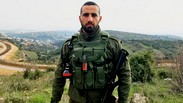
'This is my country, I serve in the IDF,' says Muslim IDF soldier
After year volunteering with an Israeli youth movement, Bilal Taha is proud to be in a combat unit, even if it means guarding settlements, and believes more Arabs will soon join the army.
Before leaving his IDF base, 21-year-old Corporal Bilal Taha removes his military uniform and changes into civilian clothing; only then does he board the bus home to his Galilee village of Deir al-Asad, where service in the IDF is unusual, to say the least. Taha is a rare phenomenon, an Israeli Arab who chose to serve in the army.
“There are many who are not happy with my being a soldier,” he says, “and I don’t know what their reaction would be if I entered the town in uniform.”
Is it dangerous?
“No, it isn’t, but it’s a little strange,” he responds. “I will give you an example: I heard that when immodestly dressed women enter Beit Shemesh people react negatively. So it is with us: people wouldn’t react violently, but it is unusual.
“Most of my friends chose to study and not enlist, and sometimes they laugh at me and say: ‘you will go to Gaza? To war? It's dangerous, just forget about it.’ One uncle told me that the IDF does all sorts of things to the Arabs. Jews don’t understand me; they think I’m a loser. But I nonetheless chose to enlist,” he says.
Before enlisting in the IDF in 2017, Taha spent a year volunteering at the Federation of Young Students and Workers, a left-wing youth movement in Israel, where he says he made up his mind to enlist. During this year, he visited friends across the country, witnessing different lifestyles. This led him to the conclusion that there exist more commonalities than differences between Jews and Arabs in Israel.
“We spent a week at a Safed Yeshiva (seminary), a month at the Ofra settlement and we also visited my village,” he says. “We observed the differences and similarities between all those places.”
How is Ofra different than Deir al-Asad?
“There is no difference; only the location, language and the residents’ religion. Judaism and Islam are very similar. A Jerusalem household welcomes you the same way as one in Deir al-Asad.”
As a West Bank settlement, was it not strange for you to visit Ofra?
“When we were there, I saw children talking about our group and how one member is an Arab, so I turned to them and said ‘I am an Arab.’ I understood that for them it was strange to host an Arab in Ofra. They expressed interest in me. There was an attack there shortly before; it is sad to hear about such events… we are all just human beings.”
His first position in the IDF was in the department that encourages minorities to enlist and supports them throughout their service. After a short while, however, he sought a more active role as a combat soldier.
But the process was far from smooth. As an only son, he needed his parent’s approval to serve in a combat unit, from which his mother tried to discourage him. But he was insistent and managed to convince her to sign the necessary forms. His father, he said, was supportive from the start, and wanted him to become an officer.
Bilal now serves in the Tavor Battalion of the Home Front Command. Sometimes he finds himself in the midst of complicated situations. Currently he is stationed in the northern West Bank where his unit guards settlements.
Do your neighbors express interest in your service?
“Yes, they ask about my activities and if I shot anyone — a legitimate question from people who only know the military from internet videos. They also ask why I left my administrative position close to home to serve in combat… But I have only become more confident in my decision. I live here, this is my country, I pay taxes, respect the flag and the anthem and serve in the IDF.”
All his fellow service members are Jewish and he is considerate of their customs. He doesn’t eat cheese and schnitzel in their presence in the dining room (Jews are not allowed to eat meat and dairy products together) and he stands during the Shabbat Kiddush and Havdala ceremonies.
Bilal conducts his Islamic prayers at a discreet location on the base so as not to attract undue attention. “I prefer that people ask me questions than talk behind my back. Some ask about the 'Allahu Akbar' (God is great) phrase they hear from the mosque loudspeakers, and about suicide bombers who use the expression. I tell them that it is mere stupidity.”
He believes that an increasing number of Israeli Arabs will enlist in the IDF in the future. “I know that many in Deir al-Asad want to help and participate. Perhaps they fear change, but many will serve and don the uniform. There is a villager who is trying out for the paratroopers soon, he consulted with me and I assisted and supported him. The point isn’t whether he gets in, but that he wants to join.”










